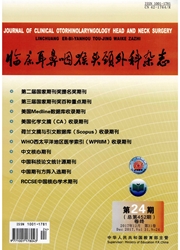

 中文摘要:
中文摘要:
目的:探讨腺病毒E1A基因通过下调人鼻咽癌CNE-2Z细胞血管内皮生长因子(VEGF)的表达,来提高人鼻咽癌CNE-2Z细胞对放疗的敏感性。方法:选用人鼻咽癌CNE-2Z细胞为靶细胞,分别用PBS、Ad-β-gal、Ad-E1A作用48h后,用6MVX线分别给予0、2、4、6、8和10Gy剂量照射后,用MTT法和流式细胞仪检测3组细胞存活率及细胞周期变化来观察E1A基因对人鼻咽癌CNE-2Z细胞放疗敏感性的影响,同时用RT-PCR和免疫细胞化学法检测3组细胞VEGF水平的表达。结果:经照射后Ad-E1A组的细胞存活率明显低于PBS对照组和Ad-β-gal对照组。Ad-E1A组细胞的生长速度明显慢于PBS对照组和Ad-β-gal对照组。RT-PCR和免疫细胞化学结果显示Ad-E1A组比PBS对照组和Ad-β-gal对照组的人鼻咽癌CNE-2Z细胞的VEGF表达明显下降。结论:E1A基因通过下调VEGF的表达来提高人鼻咽癌细胞对放疗的敏感性。
 英文摘要:
英文摘要:
Objective:To determine the effect of Ad-E1A gene therapy on the radiosensitivity of nasopharyngeal carcinoma cell by downregulating the expression of VEGF in vitro. Method: The human nasopharyngeal carcinoma CNE-2Z cell lines were investigated. The recombinant adenovirus vector containing EIA gene was used for this study. After CNE-2Z cells was treated with PBS, Ad-β-gal and Ad-E1A for 48 h, the three groups were irra- diated in different doses at 0,2,4,6,8 and 10 Gy, the cytotoxieity was determined by MTT assay and cell cycle was analysis by flow cytometry. The VEGF expression were evaluated by RT-PCR assay and immunocytochemical analysis. Result: Significant cell deaths by IR were observed in a dose dependent manner in the three group CNE-2Z cells. After transduction of the E1A gene into CNE-2Z cells, the sensitivity of these cells to radiation was enhanced than the PBS treated group and Ad-β-gal treated group. Cell growth inhibition in Ad EIA group by IR was strongly enhanced than Ad-β-gal treated group and PBS treated group. RT-PCR assay and immunocytoehemical a nalysis showed VEGF expression was downregulated in Ad-E1A treated group. Conclusion.. E1A gene therapy can effectively enhance the nasopharyngeal carcinoma cell sensitivity to the radiotherapy by down-regulating VEGF expression. These findings may pave the way for efficient radiation-gene therapy to NPC in future.
 同期刊论文项目
同期刊论文项目
 同项目期刊论文
同项目期刊论文
 期刊信息
期刊信息
